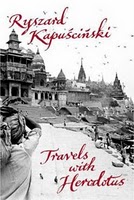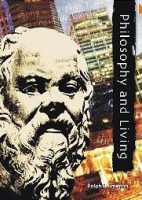Travels with Herodotus (2004) by Ryszard Kapuscinski (English translation:2007)
Rating: 




Kapuscinski was a great journalist and travel writer, and in part of this, his last book he presents a few fragments, a minuscule part of his wide experiences. These fragments become shorter and shorter while his reflections about Herodotus become longer and longer, so much so that the greater part of the work is about the Greek historian. The book is beautifully translated from the Polish by Klara Glowczewska.
shorter and shorter while his reflections about Herodotus become longer and longer, so much so that the greater part of the work is about the Greek historian. The book is beautifully translated from the Polish by Klara Glowczewska.
Born in 1932, Kapuscinski grew up in a Poland which had become Communist after the war. He became a journalist, and round about 1955 he was sent abroad, in the first place to Italy. The first set piece comes early in the book: his first time out of Poland, his first travel by air, and the stunning impression, as his aircraft descended at night to Rome airport, of a city sparkling with lights and such a contrast with the very low-wattage country from which he had come.
Then he is sent to India: another memorable description of dense crowds sleeping on the platforms of Calcutta railway station.
“A man is pushing his way through the huddled multitudes. He jostles an old woman, her bowl drops from her hands, and rice scatters onto the platform, into the mud, amidst garbage. In that split second, children throw themselves down, dive between the legs of those still standing, dig around in the muck trying to find the grains of rice. The old woman stands there empty-handed, another man shoves her. The old woman, the children, the train station, everything- soaked through by the unending torrents of a tropical downpour..”(p29).
To China next, and the highlight of that section for me is him spelling out the contrast between the teachings of Confucius and those of Lao-Tse.
“A man who managed momentarily to escape the carnage of war, is still haunted by uncertainty and fear of tomorrow, and perforce asks himself: How does one survive? Confucius and Lao-Tse each give a different answer. Confucius holds that man, being born into society, has certain obligations. If you obediently hew to the dictates of your parents, and the existing order, you will survive. Lao-Tse, the creator of Taoism, however, advises keeping oneself at a remove from everything. Nothing lasts, says Lao-Tse, so do not become attached to anything, maintain your distance, do not try to pursue or possess something. Tao is a path not a heading, and to observe Tao is to keep to that path..”(p67).
He has sinister experiences in Cairo. He was in the Sudan and then in the anarchically violent Congo, then in the Abyssinia of Haile Selassie, where travel was scarcely less dangerous. After this, the accounts of his travels become ever briefer. In Dar-es-Salaam he is struck by the multi-ethnicity of that meeting point between Africa and Asia. Then to Algiers, arriving the day after Ben Bella had been overthrown by the military (1965), and a city where the mix of populations and religions was more flammable. Next Senegal and Goree, with their terrible history of the slave trade. He was in Iran during the final days of the Shah’s rule; but says little about the political situation, much more about his visit to Persepolis, to which he was drawn by Herodotus’ stories of the Persian Empire.
“Herodotus devotes his life to preserving historic truth, to prevent the traces of human events from being erased by time; however his main source of research is not first-hand experience, but as it was selectively remembered by others..We can try to minimize or mitigate it, but we will never approach the objective ideal. The subjective factor, its deforming presence, will remain impossible to strain out. Herodotus expresses an awareness of this predicament, constantly qualifying what he reports: ‘as they tell me’, ‘as they maintain’, ‘they present this in various ways’, etc. In fact, though, however evolved our methods, we are never in the presence of unmediated history, as it appeared to someone..This has been the nature of the enterprise always, and the folly may be to believe one can resist it. This fact is perhaps Herodotus’ greatest discovery” (p272).
For, from the beginning, he has always taken on his travels a copy of the Histories of Herodotus, a writer whose attraction to him is such that not only does he become very fond of him, but also finds that he came to identify more and more with the world and events that he portrayed, than with the world which Kapuscinski was himself experiencing, aware though he is of the gap between the facilities (transport, reliable maps, sources of information like libraries or archives, methods of communication) available to the two of them. Herodotus helps him to escape from what T.S.Eliot called `the provincialism of time’.
Kapuscinski often interrupts the stories of his own experiences by recounting episodes he has come across in the works of the great historian. These sometimes deal with the regions in which Kapuscinski is himself travelling at the time; but at other times I can see no direct connection between their narratives. However, there is a strong connection between their interests. Like Kapuscinski, Herodotus has the urge to record, so that history should not be forgotten. Like Kapuscinski, Herodotus is intrigued by the sheer difference between his own civilization and the customs and mind-sets of other people; and both are insatiably curious and restless, always on the move.
Both writers are seized of the vastness of the spaces in their own time, and even more by the vastness of the spaces of which they know nothing. Herodotus’ accounts were based on his own travels in search of oral information about the past history of these regions, though he frequently tells us that he cannot vouch for the truth of what he has been told. Sometimes Kapuscinski recreates Herodotus’ scenes in his mind, bringing his own imagination to bear. At other times he is frustrated by questions to which he himself would want answers; and he is struck also by the absence of any moralizing or commentary in Herodotus’ accounts of the most appalling cruelty, massacres and unspeakable barbarities, though at other times Herodotus will make philosophical judgments about history – judgments which have profoundly influenced Kapuscinski. All this emerges while we are led through Herodotus’ accounts, first of the expansion of the Persian Empire and then of that epic conflict between that Empire and the Greeks which has captured the imagination of generation after generation: Xerxes versus Themistocles; freedom versus servitude; sea-power versus land-power; Thermopylae, Salamis.
A fascinating weave.
My thanks to Mr Ralph Blumenau
 Ralph Blumenau is a retired school teacher and author. He lectures on the History of Europe, the History of Philosophy and on the History of the Jews. He has published a 630 page history of philosophy called Philosophy and Living. “He explains concepts in a clear and elegant manner, always defining his terms precisely but without patronising the reader. He has managed to communicate abstract ideas in a natural and lively style. Although the author is a historian, his book is not only a history of ideas but it is also an exploration of their significance to and influence on mankind”.
Ralph Blumenau is a retired school teacher and author. He lectures on the History of Europe, the History of Philosophy and on the History of the Jews. He has published a 630 page history of philosophy called Philosophy and Living. “He explains concepts in a clear and elegant manner, always defining his terms precisely but without patronising the reader. He has managed to communicate abstract ideas in a natural and lively style. Although the author is a historian, his book is not only a history of ideas but it is also an exploration of their significance to and influence on mankind”.